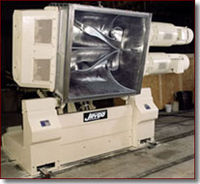Difference between revisions of "Blade Mixers"
(Created page with "Category:Mixing{{Knoppen}} <noinclude><!------------------------------------------------ * READ THIS FIRST * Only edit this page if you can improve the content. * Improper u...") |
PurplePen19 (talk | contribs) |
||
| Line 7: | Line 7: | ||
* Please start editing this page after the /noinclude | * Please start editing this page after the /noinclude | ||
* -------------------------------------------------></noinclude> | * -------------------------------------------------></noinclude> | ||
[[File:Blade Mixers.jpg|thumb|200px|right|Blade Mixers]] | |||
'''Blade Mixers''' are engineered specifically for kneading, mixing, and homogenizing wet, pasty, and highly viscous products. The two shaped blades, which sit horizontally and parallel at the bottom of the mixing trough, provide thorough mixing. The blades rotate at different speeds in opposite directions causing the product to be transferred from blade to blade and from end to end, resulting in a figure eight pattern. | |||
==Applications== | |||
Blade Mixers are suitable for many applications, including: Sealing compounds, asphaltic derivatives, mastics, hot-melts, floor coverings, colorings, rubber base, master-batches, chewing gum, rubber compounds, silicone, lubricating greases, dispersed pigments, butyl, gums and adhesives, ceramic paste, polyester compounds, greasy inks, pencil leads, explosives, powders to granulate, PVC coatings, resins, soap, brake linings, carbon electrodes, celluloid, Bakelite, battery paste, polishing pastes. | |||
==Videos== | |||
<youtube>NniOVKK8b54</youtube> | |||
<youtube>zf1jUvsN_5M</youtube> | |||
Latest revision as of 05:50, 29 August 2012
Blade Mixers are engineered specifically for kneading, mixing, and homogenizing wet, pasty, and highly viscous products. The two shaped blades, which sit horizontally and parallel at the bottom of the mixing trough, provide thorough mixing. The blades rotate at different speeds in opposite directions causing the product to be transferred from blade to blade and from end to end, resulting in a figure eight pattern.
Applications
Blade Mixers are suitable for many applications, including: Sealing compounds, asphaltic derivatives, mastics, hot-melts, floor coverings, colorings, rubber base, master-batches, chewing gum, rubber compounds, silicone, lubricating greases, dispersed pigments, butyl, gums and adhesives, ceramic paste, polyester compounds, greasy inks, pencil leads, explosives, powders to granulate, PVC coatings, resins, soap, brake linings, carbon electrodes, celluloid, Bakelite, battery paste, polishing pastes.
Videos
